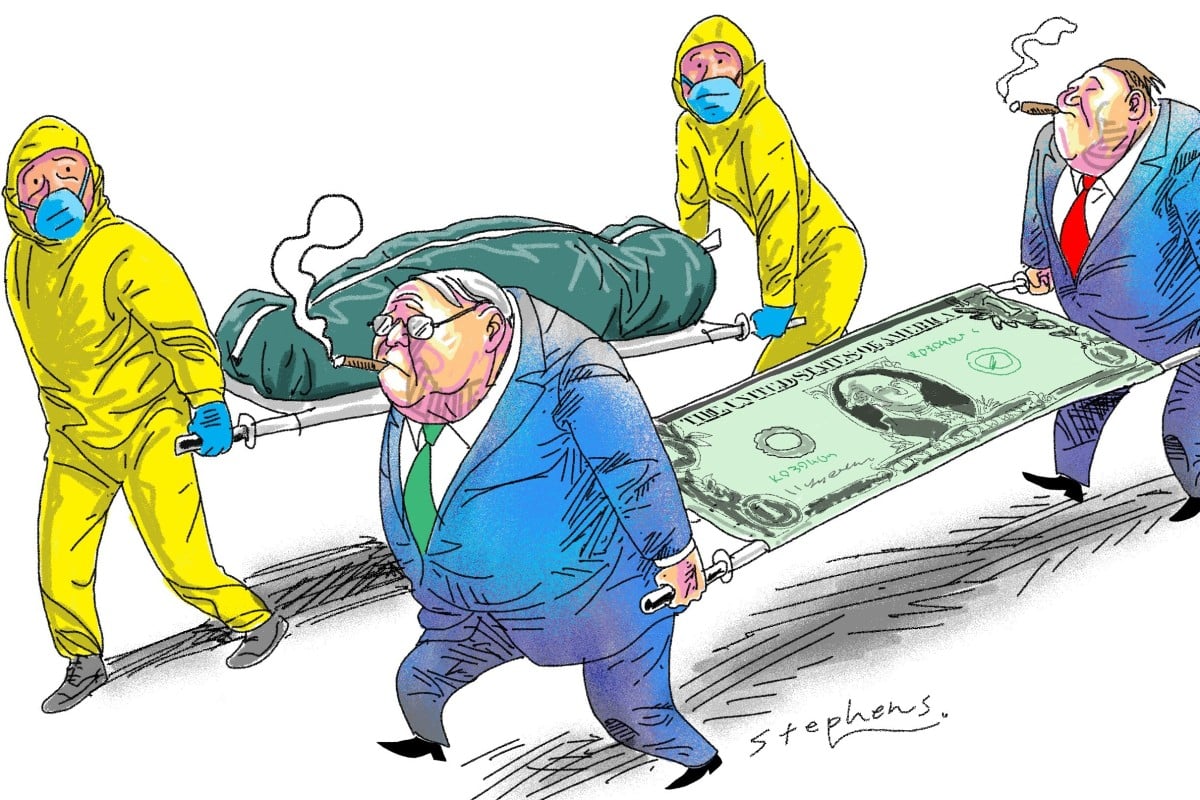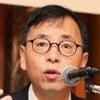The global ruling elite, who ignored expert warnings of a pandemic, are even now proposing stimulus measures to prop up markets, rather than truly help people
Expect any attempts to align supply chains to health care or welfare imperatives to meet fierce resistance from vested financial interests, further holding back economic recovery
Andy Xie Published: 6 Apr, 202

Illustration: Craig Stephens
As the Covid-19 pandemic unfolds, hundreds of thousands may well die, possibly even millions, if the hot weather cannot slow the disease in the southern hemisphere. Governments and people may pin their hopes on effective medicine and/or a vaccine coming come soon, but neither is likely. This catastrophe may well last well into next year and change the world as we know it.
While the virus is a natural phenomenon, the ensuing tragedy should have been preventable. Infectious disease experts have been predicting a pandemic like this as a certainty. Yet, the global ruling elites ignored it.
Instead, they gather at Davos every year to talk about power, money and technology – mostly about its potential for making money. They have not focused on the No 1 responsibility of any ruling class – the safety of the people.
If health care systems had been prepared for a pandemic like this, there would be 100 times fewer casualties.
Instead of protecting people, they spent trillions of dollars bailing themselves out after creating the 2008 global financial crisis through their greed. Then, they built huge financial bubbles to make themselves richer than ever. If there is justice, these elites should go to jail for their criminal negligence.
The current chorus from these same influential people is about how to keep stimulating the economy with trillions of dollars. Their real purpose is to prop up financial markets, not to help people. When the stimulus cost is tallied, it is likely to surpass US$10 trillion, twice as much as proposed now.
While financial assistance for the unemployed is necessary, help for big businesses is hard to justify. The US government has budgeted US$500 billion to help businesses. For years, many of these businesses have used their profits and borrowed more to buy back stocks. Helping them is a grave injustice. Such policies only make the world less stable.
The trillions of dollars in aid will not return the world to where it was; this is not like restarting a disrupted film. The global economy could fall by over 20 per cent in the second quarter, the biggest drop ever during peacetime. Any recovery during the second half of the year, or beyond, is likely to be anaemic for four reasons.
First, life cannot go back to normal so soon. Social distancing may slow down Covid-19, but will not eliminate it. If people return to their old ways, the virus is likely to come back. Social distancing, even loosened, has a significant impact on the services industry.
The tourism sector, for example, will remain shuttered for the foreseeable future. It employs one in 10 people in the non-agricultural sector. This factor alone will keep the global economy below the 2019 level for at least two years.
Second, this crisis has exposed the fragility and unaccounted extra costs of maintaining a
global supply chain. Electronics and car industries have been severely interrupted. Just-in-time inventory management and the concentration of parts production has left the global economy extremely vulnerable to a black swan event such as Covid-19.
The cost is more than just to the gross domestic product. When the production of health care equipment and medicines is interrupted, lives are lost, unnecessarily.
Coronavirus could cause global food shortages by April as export curbs worsen supply chain problems
Second, this crisis has exposed the fragility and unaccounted extra costs of maintaining a
global supply chain. Electronics and car industries have been severely interrupted. Just-in-time inventory management and the concentration of parts production has left the global economy extremely vulnerable to a black swan event such as Covid-19.
The cost is more than just to the gross domestic product. When the production of health care equipment and medicines is interrupted, lives are lost, unnecessarily.
Coronavirus could cause global food shortages by April as export curbs worsen supply chain problems
Political forces are likely to ensure global companies rearrange their supply chains to reflect national interests, not just profit maximisation. This process of deglobalisation will slow the economy and generate considerable inflationary pressure.
Third, the Covid-19 crisis has burst financial bubbles built up since 2008. The US stock market, for example, is normalising, which could wipe out US$15 trillion in wealth. As the slowing global economy increases credit risks, the overleveraged shadow banking system may catch fire.
Third, the Covid-19 crisis has burst financial bubbles built up since 2008. The US stock market, for example, is normalising, which could wipe out US$15 trillion in wealth. As the slowing global economy increases credit risks, the overleveraged shadow banking system may catch fire.
American companies have been borrowing for years to buy back stocks. Some of their bonds are likely to default. This kind of debt crisis will be a significant drag on the global economy.
Lastly, the crisis is forcing governments to reallocate resources to health care systems and other forms of welfare protection. The US spends nearly one-fifth of its GDP on health care but is failing to cope with a pandemic like this because resource allocation has been driven by profit, not the safety of the masses. As vested financial interests resist the reallocation of resources, the economy is likely to be dragged down.
Hong Kong’s property market is a small but extremely egregious example of screwing people over for the benefit of the rich. With people asked to stay at home, the city’s small and subdivided flats with their congested conditions – making it so much easier for a virus to spread – are literally killing people.
People become depressed when confined in small spaces for too long. Hong Kong’s property market is at best a screw-the-poor and rob-the-middle-class plot to benefit the rich and powerful, often in the guise of an everybody-can-get-rich casino. This crisis has exposed it as a bloodsucking conspiracy against the people. Is a revolution avoidable?
In this grim tragedy, the good news is about the scientific race for new equipment, medicine and a vaccine to fight the virus. Human ingenuity tends to become turbocharged under extreme pressure. The discoveries during the second world war have powered the tech economy ever since. The discoveries made during this Covid-19 war may unleash a wave of bioscience advances to benefit mankind for ages to come.
Andy Xie is an independent economist

Dr Andy Xie is a Shanghai-based independent economist specialising in China and Asia, and writes, speaks and consults on global economics and financial markets. He joined Morgan Stanley in 1997 and was managing director and head of the firm’s Asia-Pacific economics team until 2006. Prior to that he spent two years with Macquarie Bank in Singapore, where he was an associate director in corporate finance. He also spent five years as an economist with the World Bank. He was voted one of the 50 most influential persons in finance by Bloomberg magazine in 2013.
No comments:
Post a Comment